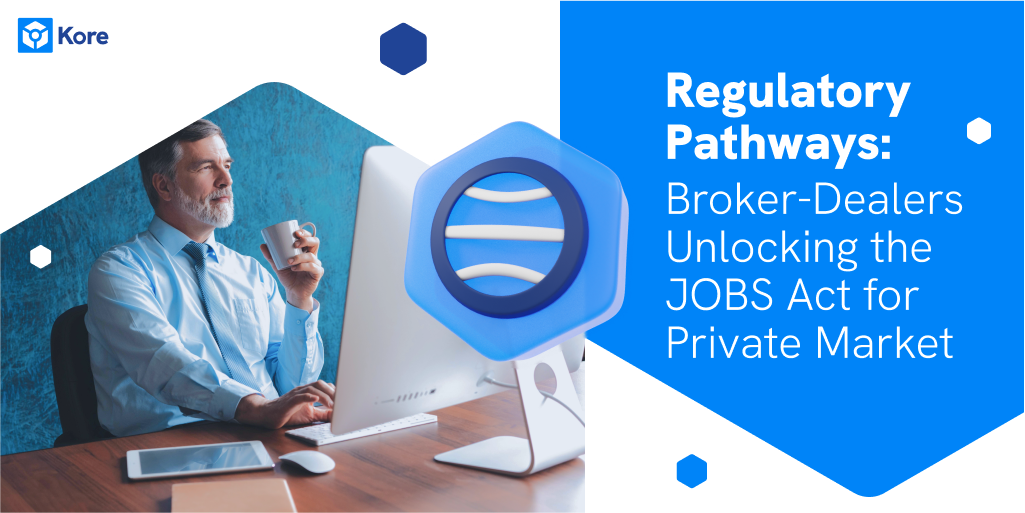The rise of a new era in private equity

Once restricted to a specific audience, the Private Capital Markets are now booming. The new regulations and advancements in AI have not just changed the game; they’re rewriting the entire rulebook. In a special episode of The Big Data Show hosted by Nate Latimer, Kore’s Oscar Jofre shared his insights, exploring how the convergence of these factors is promoting the rise of a new era of opportunities in private equity.
It all started with the JOBS Act
The 2012 JOBS Act, spearheaded by David Weild and signed into law by President Barack Obama, marked a turning point in private equity. Before the Act, companies couldn’t publicly solicit investments, nor could non-accredited investors participate. As Oscar Jofre discussed in his appearance on “The Big Data Show,” this legislation revolutionized capital raising for private companies.
The JOBS Act introduced key changes, such as allowing businesses to raise capital through general solicitation and enabling everyday people to invest, not just institutional or accredited investors. This shift has opened up private equity, allowing more people to participate and invest as little as $5 in companies they believe in. Additionally, the new regulations have created safer and more transparent mechanisms, which helped to prevent fraud and ensure compliance.
Regulation CF and Regulation A+
Oscar explained that while the JOBS Act was passed in 2012, it wasn’t until 2015-2016 that the specific regulations—like Regulation CF and Regulation A+—were finalized.
These regulations have expanded the ability of companies to raise capital. Regulation CF allows U.S.-based companies to raise up to $5 million every 12 months from the general public, while Regulation A+ enables companies to raise up to $75 million annually, opening doors to significant growth.
In addition to opening new doors for capital, these regulations also include investor protection mechanisms such as limits on investment amounts for non-accredited investors in Regulation CF and detailed financial disclosures required under Regulation A+. These measures promote transparency and reduce the risk of fraud, fostering greater trust between companies and investors.
Insights for startups looking to raise capital
The private equity industry has always embraced change, and AI is the next frontier. It’s redefining the rules of the game, creating a future where the connection between companies and investors can be more effective than ever before.
As Kore’s CEO mentioned, there has been a shift from a focus on marketing through video content to one dominated by data-driven strategies. While videos were once considered key to generating investor interest, companies are now tapping into data analytics and AI to thrive.
It allows companies to analyze user behavior, interests, and purchase habits from thousands of online data sources, making it easier to target their audience.
In this new landscape, having real-time access to data is key. Companies can no longer rely on generic marketing tactics. Oscar emphasized that while data is crucial, it’s the understanding of behavior and personas that makes campaigns successful.
Tokenization and the Rise of Fractional Ownership in Private Equity
During the talk, they mention one of the most transformative innovations in private equity: tokenization.
Tokenization enables the representation of asset ownership as digital tokens on a blockchain, allowing companies to divide their assets into smaller, tradable units. This concept, once limited to stock markets, is now making its way into private equity, opening the door for fractional ownership.
For example, a private company can issue tokens representing shares in its equity, enabling smaller investors to buy in for amounts that would have been impossible a few years ago. By making private equity more accessible, tokenization helps to democratize the sector even further. During the podcast, Jofre explained how Kore is already integrating blockchain to provide a compliant environment and ensure security and transparency in every transaction.
Kore’s role in the market
Kore’s mission, according to Oscar, is to help clients be more efficient and compliant, providing them with infrastructure for managing private capital raises. In simple terms, Kore’s goal is to help companies comply with regulations and make capital raising easier. The platform connects businesses with professionals like lawyers, broker-dealers, and escrow providers to simplify the process of securing funds. This infrastructure simplifies the process, reducing the time and cost of raising capital.
Kore can be described as an “information highway,” guiding businesses through the steps of preparing, promoting, and managing their capital raises. Last but not least, the Kore’s Kore ID allows investors to carry their investments across multiple platforms, ensuring portability and streamlining the investor experience. This feature removes the friction typically associated with investing through various platforms, giving investors more control over their portfolios.
Embracing the Future of Private Equity
The combination of the JOBS Act, AI technology, and blockchain is creating a new era of opportunities in private equity. As discussed on The Big Data Show, these changes are making it easier for companies to raise capital while simultaneously providing new opportunities for everyday investors.
Tune in to the full episode and be part of this new era in private equity investing!





